A woman's faithful friend is a watermelon: how is it useful for the body
In August, the watermelon season comes. It is difficult to deny yourself the aromatic, soft, sweet and pinkish pulp of watermelon. Moreover, the berry is very useful: it is a dietary product, it quickly satisfies the feeling of hunger, contains trace elements and vitamins, does not harm even pregnant women, and helps to cope with diseases.
About what watermelon is good for the body women and what are its other characteristic properties you will learn in the article.
The content of the article
Composition and calorie content of watermelon
Calorie content of watermelon - only 27 kcal. The content in 100 g of proteins is 0.6 g, fats - 0.1 g, carbohydrates - 5.8 g. The low calorie content is explained by the fact that 92.6% of water is present in the composition of watermelon. Dietary fiber - 0.4 g, mono - and disaccharides - 5.8 g. At the same time, 0% starch and cholesterol.
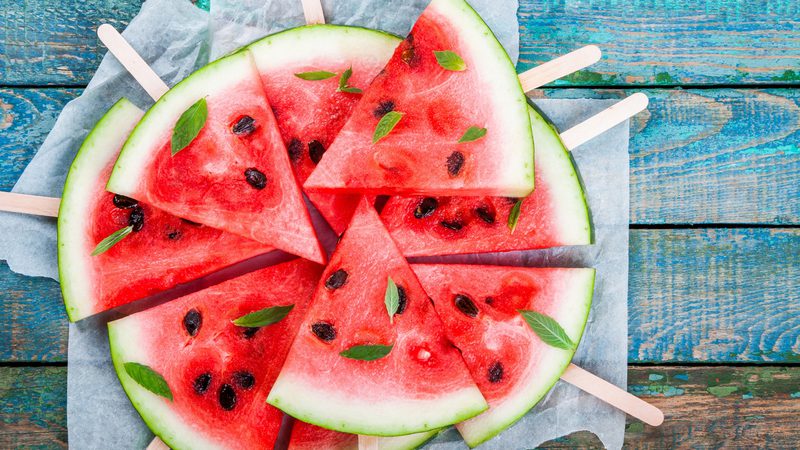
More details about vitamin composition see the table.
| Vitamins, micro- and macroelements | Content in watermelon per 100 g of product |
| Vitamin C | 7 mg |
| Vitamin B2 (riboflavin), vitamin B6 (pyridoxine), vitamin E | 0.1 mg |
| Vitamin PP (niacin) | 0.3 mg |
| Vitamin B9 (folic acid) | 8 μg |
| Vitamin A | 17 mcg |
| Iron | 1 mg |
| Potassium | 110 mg |
| Calcium | 14 mg |
| Magnesium | 12 mg |
| Sodium | 16 mg |
| Phosphorus | 7 mg |
Watermelon is one of the seven leaders among other foods in terms of the content of the natural antioxidant - lycopene: 4532 mcg per 100 g. It protects cells from premature aging and cancer.
What can you eat
Watermelon is an amazing berry, each part of which has unique properties. Eat not only sweet pulpbut also the seeds, the white part of the rind.
Pulp
The tastiest part of watermelon. It is recommended to eat the pulp, leaving 0.5-1 cm from the crust. It is in the peel that harmful substances accumulate, which get on it during transportation.
Salads, soup are prepared from the pulp, compote, juices, lemonades and cocktails. She's frozen to make liquor salted for the winter and make fruit sandwiches.
Juice
Watermelon juice contains the amino acid citrulline. Once in the body, it turns into arginine, which is needed to supply the muscles of the body with oxygen and nutrients. Therefore, watermelon juice will add strength in physical education classes or if you have to spend the whole day on your feet.
Prepare watermelon juice from ripe, juicy berries. Wash, cut into pieces, peel. The pulp is cut into small pieces, passed through a juicer. The resulting juice will be sweet, so no sugar is added to it.
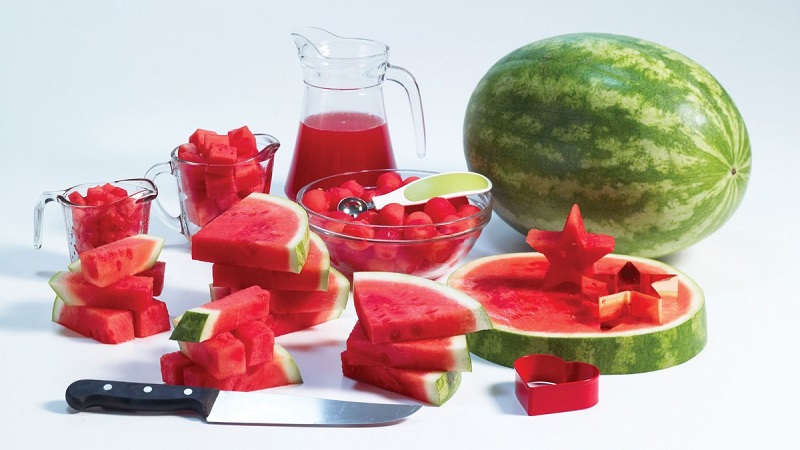
Seeds
Watermelon seeds eat in the following options:
- Raw Is the most common way to use it.
- Fried. First, the bones are dried on the windowsill, then fried in a dry frying pan. As soon as they start popping, pour in ¼ cups of salt water and fry until the liquid evaporates.
- Ground into flour... They add it to sauces, salads, soups and energy cocktails in sports nutrition.
- Dried - sold in stores, slightly flattened and already peeled. At home, watermelon seeds are dried in the sun. They are stored in a dry place. This simple and safe way to preserve the nutrients of the seeds until winter.
Peel
Use the hard white portion of the flesh next to the rind.The striped skin is removed. Prepare from the white part of the rind jam and candied fruits.
Useful properties of watermelon for a woman's body
You can't eat watermelons alone to get a vitamin charge. But in the season this berry is recommended to be introduced into the diet.
Digestion normalization
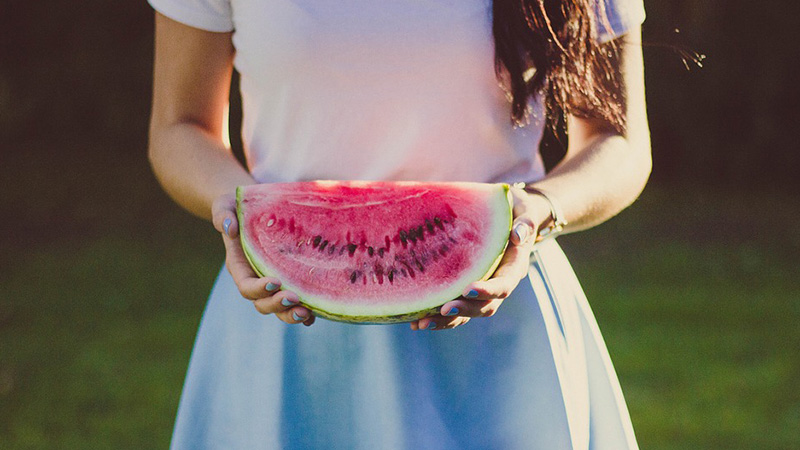
Folic and pantothenic acids contained in watermelon improve metabolic processes and stimulate digestion. The intestinal microflora is restored, and beneficial microorganisms multiply more actively.
Fiber in watermelon cleanses the intestines, bowel movements when consuming watermelon will be regular.
Scientists have proven the oncoprotective properties of watermelon fiber. People whose diet is rich in it are less prone to colorectal cancer, cancer of the stomach, intestines and other organs of the digestive system.
In case of inflammation of the gastrointestinal tract, the pectin substances of watermelon adsorb and remove harmful substances, protect the intestinal mucosa and promote its healing due to the bactericidal action.
Reducing calorie intake

They do not recover on watermelon due to the watery composition of its pulp. The quantitative composition of vitamins, minerals and trace elements is small, but they are all balanced and easily absorbed.
Attention! Meals made with watermelon have more calories than regular pulp due to the addition of third-party ingredients. Consider this when making your diet.
Cleans the body
With water, of which watermelon is almost entirely composed, toxins and toxins are removed from the intestines and from the whole body.
The body is saturated with watermelon quickly. Just as quickly, it leaves the stomach, showing a laxative effect, therefore, the use of berries is recommended for constipation.
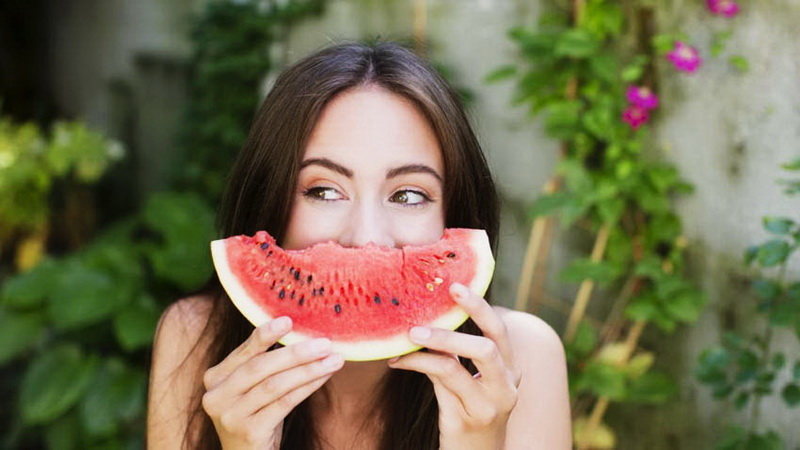
Normalizes blood pressure
This is helped by citrulline, which is converted in the body into arginine. The second has vasodilating properties and lowers blood pressure.
Important! Hypotensive patients and women on critical days are advised to eat no more than 2-3 slices of watermelon per day, so as not to lower the pressure even more and not to provoke an increase in menstruation.
Has a diuretic effect
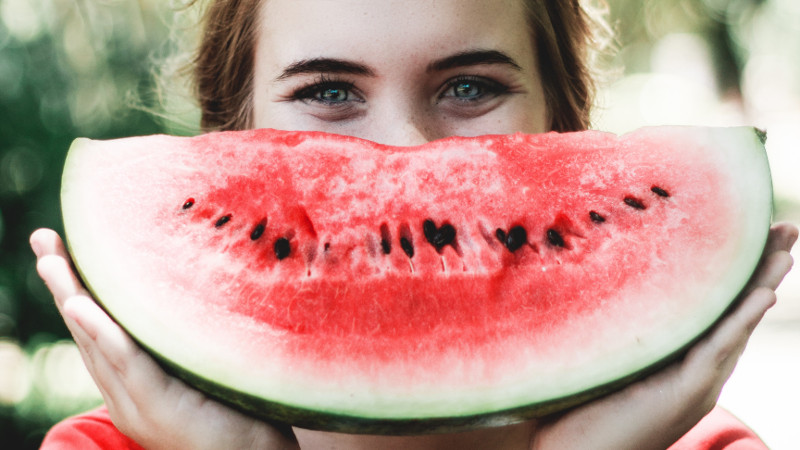
Watermelon is a diuretic, diuretic. It accelerates the excretion of fluid from the body, reduces its content in tissues, washing out salts and excess uric acid.
The diuretic properties of the berry are due to the fact that a large amount of water and alkaline compounds are concentrated in the pulp. Potassium, oxalate, urate salts of urine, interacting with alkali, dissolve, sand and stones in the genitourinary system are not formed.
Improves metabolism and condition of skin, hair
This is due to three components:
- folic acid which is involved in the creation of new cells and maintains them in a healthy state;
- magnesium, which is responsible for the metabolism, the functioning of the nervous system, the health of bones and teeth, maintains skin tone, prevents stretch marks, maintains the health of hair and nails;
- lycopene - an antioxidant that protects skin cells from ultraviolet radiation and regulates pigmentation.
To make a face mask for skin that has lost elasticity, mix 2 tbsp. l. watermelon juice with 1 tbsp. l. wheat flour. Apply on face and neck for 15 minutes, once a week.
Prevention of cardiovascular diseases
Fiber removes harmful cholesterol from the body, normalizes blood pressure, and reduces the risk of strokes and heart attacks.
Vitamin PP, contained in watermelons, strengthens blood vessels, increases the elasticity of their walls, cleans arteries and blood vessels from plaque. The daily dose of this vitamin is 50 mg. It is contained in 150 g of watermelon.
Other

Watermelon is indispensable for normal liver function: it has a choleretic effect, and glucose and fructose nourish the tissues.
The berry calms the nervous system, improves mood due to glucose, which helps to produce serotonin - the hormone of happiness.
It also increases hemoglobin due to the content of iron salts, and is recommended for anemia.
Benefits of watermelon for pregnant and lactating women
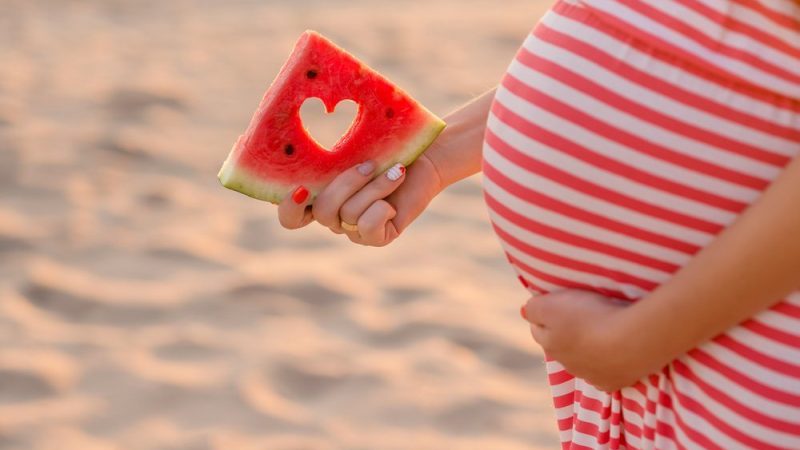
Pregnancy and breastfeeding are crucial stages in the life of a woman and a baby. The beneficial properties of watermelon support women's health during these periods. More details about them are in the table.
| Watermelon components | Benefits for pregnant and lactating women |
| Mono- and disaccharides | Replaces high-carbohydrate fruits, candies and cakes. Pregnant women sometimes want something sweet! Watermelon is very sweet, it is eaten in its pure form so that glucose is absorbed in full and does not cause an increase in blood sugar. |
| Cellulose | It has a mild laxative effect. Relieves constipation in the first and last trimesters of pregnancy and in the first months after childbirth.
|
| Vitamin C, ascorbic acid | Strengthens the immune system, relieves drowsiness, lethargy and depressed mood. Ascorbic acid helps to form the fetal skeleton, as it improves the absorption of calcium and retains it in the woman's body. |
| Vitamin B6 | Responsible for metabolism and removes excess fluid from the body. Weight is kept normal, swelling subsides, toxins are eliminated. |
| Folic acid, or vitamin B9 | Participates in the formation of the fetal brain and spinal cord. |
| Riboflavin and thiamine | They are responsible for strengthening the mother's nervous system and improving the transmission of nerve impulses in the developing fetus. |
| Magnesium and calcium | They support the cardiovascular system of the pregnant woman. They strengthen the heart and eliminate tachycardia, which is more common in the third trimester. |
| Magnesium | Relieves hypertonicity of the uterus, maintains the strength of teeth and bones, participates in the formation of the skeletal system of the fetus. |
| Potassium | Maintains water-salt balance in the body and removes excess water. This relieves stress on the internal organs and helps to cope with swelling. |
| Iron | Supports normal hemoglobin, helps to get rid of weakness, nausea, dizziness. Provides the fetus with sufficient oxygen.
Watermelon provides enough iron when feeding a baby, which saves from iron deficiency anemia. |
One slice of watermelon eliminates the attacks of nausea with toxicosis due to its juiciness and pleasant taste.
What problems does it help to cope with

Watermelon is used according to folk recipes as a diuretic, anthelmintic and laxative:
- Remove excess fluid from the body and get rid of edema a decoction of watermelon peels will help. Pour 90 g of crusts with 0.5 l of boiled water, boil for 10 minutes and insist until it cools completely. Drink 100 ml 4 times a day for a week.
- Get rid of worms a decoction of watermelon seeds will help. Grind 100 g of watermelon seeds, pour 1 liter of boiling water, place in a water bath for 45 minutes. Put to cool in a cool place, then carefully filter.
Take one glass 3 times a day. The course of treatment is two weeks. - Defeat chronic constipation it is possible if you eat 1 kg of watermelon pulp during the season during the day. The stool is normalized for 5-6 days. For the same purpose, use finely chopped and dried watermelon peels, crushed into powder: add 1 tbsp. l. watermelon powder in 1 cup of mint infusion (1 teaspoon of mint per 1 cup of boiling water, insist for 20 minutes). Take a bite with plum jam before meals until the stool is normalized.
Harm and contraindications
Watermelon can also harm the body. You need to be careful in such cases:
- With a tendency to flatulence. Watermelon causes bloating and gas.
- For kidney, stone or sand problems in them or in the bladder, the use of berries causes them to move.
- Until August came... Early watermelons are high in nitrates. Diarrhea and vomiting may occur. In pregnant women, the nitrate product causes the uterus to contract, which is fraught with miscarriages and premature birth.
- When buying watermelon halves. It is better not to buy these, as well as cut or damaged berries. Bacteria penetrate into the incisions and actively multiply. Diarrhea, abdominal pain and even intestinal infection can be earned.
- When using watermelon and at the same time dairy and sour milk products or rye bread. This causes fermentation in the intestines and severe abdominal pain. Watermelon is eaten between meals, 1.5-2 hours after meals.
- Drinking watermelon in the evening. You risk causing morning swelling due to stress on the kidneys and bladder.
- Don't eat the watermelon cut the day before yesterday... The maximum shelf life of berries in the refrigerator is a day.
- When breastfeeding... Introduce watermelon into the diet gradually, eating no more than 100 g at a time. Observe the child's reaction to the product. For three days, do not add new complementary foods in order to understand exactly whether the baby is allergic to watermelon or not.
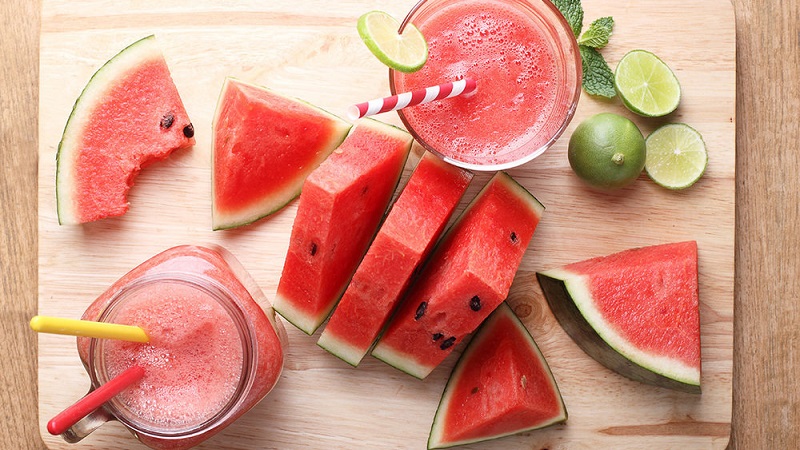
Watermelons are considered a healthy berry, but they are contraindicated if you have:
- diseases of the pancreas;
- diabetes;
- obesity;
- urolithiasis disease;
- pyelonephritis;
- nephritis;
- nephrosis;
- spleen diseases;
- increased acidity of the stomach, acute ulcer or gastritis;
- melons allergy.
Conclusion
The pulp of watermelon is indisputably healthy, dishes with berries are low in calories and therefore suitable for diets... Its components are used to prepare delicious candied fruits, medicinal products. Using the berry correctly, you will improve the condition of the body, you will be healthy and beautiful, which is especially important during pregnancy and lactation.
Do not forget about contraindications and do not neglect once again consultations with a doctor.